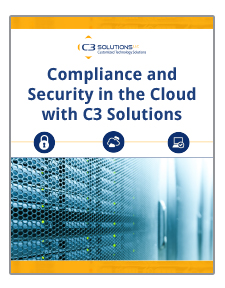 Many small business owners are the ones obligated to wear the “IT hat” in their organization. And why not? When you’re a growing business, hiring IT help for daily operations just isn’t a high priority - or in the budget. Instead, with a little bit of research, many business owners feel they (or their office manager) can handle all the IT basics on their own or with on-call help.
Many small business owners are the ones obligated to wear the “IT hat” in their organization. And why not? When you’re a growing business, hiring IT help for daily operations just isn’t a high priority - or in the budget. Instead, with a little bit of research, many business owners feel they (or their office manager) can handle all the IT basics on their own or with on-call help.
But if your business transmits or stores credit card data, it is subject to PCI DSS compliance—and the do-it-yourself IT route gets complicated (and expensive) real fast.
What is PCI DSS?
The Payment Card Industry Data Security Standard (PCI DSS) is an information security standard for all organizations that handle/transmit credit card information. It was created by a group of major credit card companies to increase the controls around cardholder data to prevent credit card fraud.
Complying with PCI DSS isn’t only a matter of following security best practices and protecting your customer’s data; it will also protect your business from severe legal penalties and fees that come from noncompliance.
Every business wants to be PCI DSS compliant to protect their customers, as well as themselves. But for small business owners who are trying to manage basic IT needs as they handle all of the other day-to-day operations, PCI DSS rules can seem overwhelming. Rather than face hefty violation fees or risk compromising their clients’ data, conscientious business owners are seeking out compliance-minded IT partner.
Outsourcing PCI Compliance
Many business owners wonder how much risk and responsibility of the compliance requirements they can really outsource. Well, it really depends on how much of your IT services you’re outsourcing to begin with.
- If you’re using managed IT services (meaning you own all your own hardware, but use a managed services provider—an MSP—in the place of hiring an internal IT department), your MSP will take on the bulk of the responsibility.
- If you have an internal IT department but are outsourcing only some tasks and services to a partner, your team will likely be most responsible for PCI compliance.
- The same principle is true for cloud services as well. If you’re outsourcing everything, they’re taking on most of the responsibility. But if you have your own IT team, there’s definitely a large gray area—some of which you’re responsible for.
 Working with a compliant provider doesn’t mean you’ll never have to worry about PCI compliance. As the owner of a small business that handles credit cards, you still have to keep your guard up and train employees to be security-savvy. But the right IT partner can certainly take on some responsibility and risk, allowing you to get back to what you do best: running your company.
Working with a compliant provider doesn’t mean you’ll never have to worry about PCI compliance. As the owner of a small business that handles credit cards, you still have to keep your guard up and train employees to be security-savvy. But the right IT partner can certainly take on some responsibility and risk, allowing you to get back to what you do best: running your company.
Learn more about achieving PCI DSS compliance (and other compliance regulations) by using hosted cloud services in our free guide, “Compliance and Data Security in the Cloud with C3 Solutions.”
